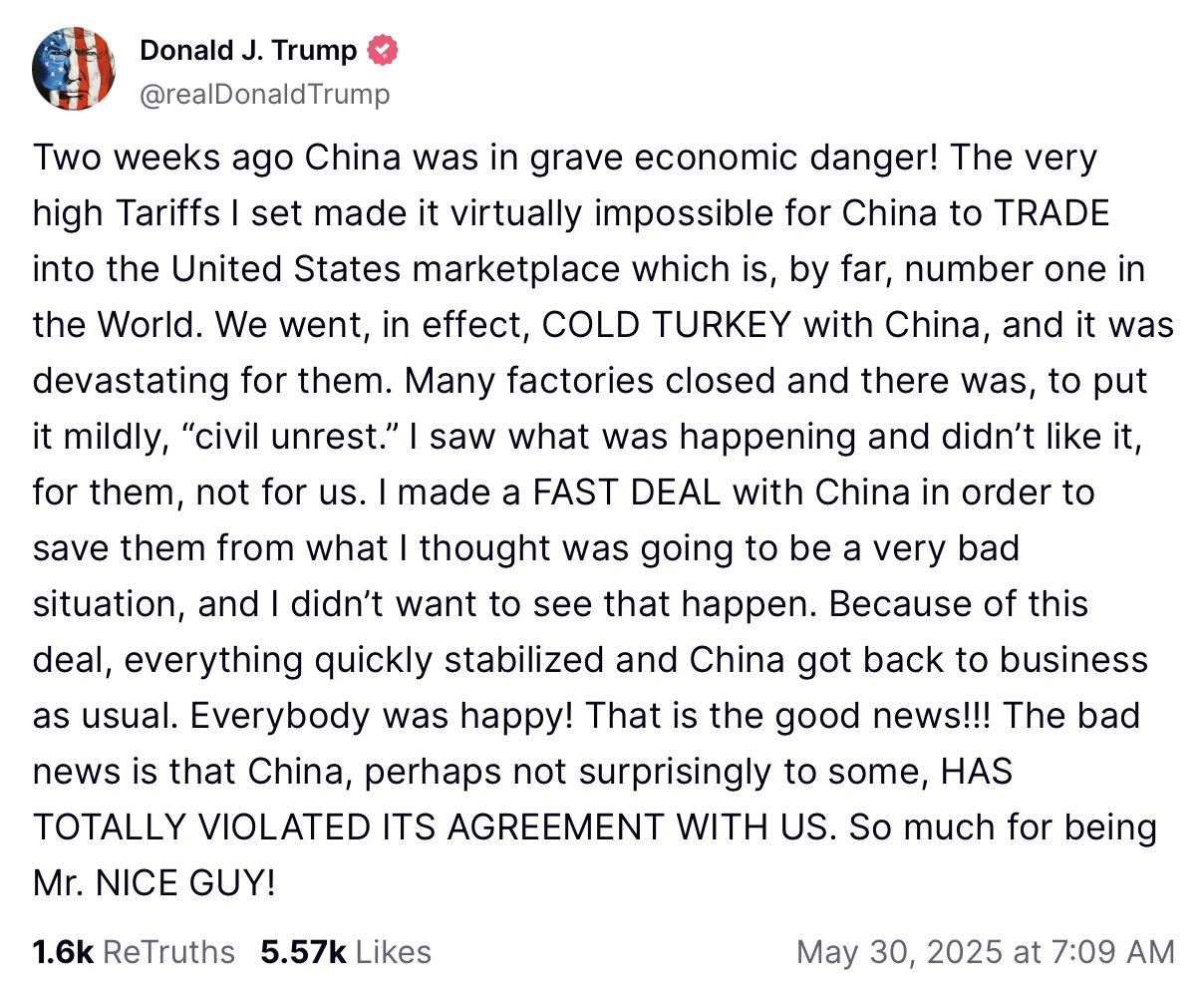Apple’s stock has been hit hard by the Trump tariff battle with China
Just hours after courts allowed the “liberation day” tariffs to continue pending appeal, President Donald Trump is claiming that China has violated a preliminary trade agreement with the US.
In a post on Truth Social, the President claims that the 90-day tariff pause resulted in already-closed factories, and “civil unrest” in the country — neither of which appear to have happened. The post on Friday also says that China has violated whatever agreement was in place for a 90-day pause in tariffs presently in place.

President Trump’s post on Truth Social
Trump administration officials are already starting their media rounds.
“United States did exactly what it was supposed to do, and the Chinese are slow-rolling their compliance,” U.S. Trade Representative Jamieson Greer told CNBC on Friday morning. “[That’s] completely unacceptable and has to be addressed.”
It’s not clear what Greer is talking about, and he declined to detail the situation further in the interview. As the US government is aware under any administration, slow-rolling compliance of international agreements is still compliance, even if it’s not at the speed the other government wants.
It’s not clear yet what the President is planning to do to respond. Presumably, he’s going to use the powers he’s granted himself under assorted emergency powers acts to reinstitute tariffs.
Ironically, the “liberation day” tariffs that President Trump applied badly broke trade agreements that the US has made in the past. Specifically, the tariffs on imports from Canada and Mexico violated the United States-Mexico-Canada Agreement that was put into place on July 1, 2020 — when President Trump was in charge.
“The USMCA is the fairest, most balanced, and beneficial trade agreement we have ever signed into law,” President Trump said at the time. “It’s the best agreement we’ve ever made, and we have others coming.”
There’s a pattern of bombshell tariff announcements on Friday mornings before the market opens by the President. This is the fourth Friday-morning dramatic tariff announcement he’s dropped since the wide-ranging tariff plan was put into place in early April.
Friday’s moves are just the latest chapter in the two month long saga
It’s been a tumultuous week for tariffs, again. The US trade court ruled on Wednesday that the April tariffs were illegal, and were not enforceable.
That didn’t last long, as an appeals court has temporarily stayed the injunction. The US and international parties have until June 9 to file arguments about the case, and the court will then rule if a longer stay is necessary.
Apple is obviously deeply impacted by tariffs that the Trump administration wants to apply across its entire global supply chain. Tim Cook noted that Apple would take a $900 million hit to its bottom line in the June quarter alone.
The on-again off-again tariff situation is threatening the release of the iPhone 17 in September. Some analysts have predicted that Apple will hike prices globally to keep profit margins up, and not just apply them to US buyers.
The Trump administration does not want Apple — or WalMart for that matter — to hike prices as a result of the tariffs. The government mostly still insists that exporting countries, like Apple manufacturing centers India and China, pay the tariffs. In fact, it is the importing companies that do, and those costs are generally passed on to the customer.
Regardless, Apple is still facing tariff issues. A tariff on all products imported with semiconductors and another on all imported smartphones is still in effect no matter what the trade court rules.
Apple stock is effectively unchanged on the news pre-market, with futures overall taking a big hit. The stock also didn’t see much of a change when the trade courts announced that the tariffs were illegal, nor when the appeals court put on the temporary stay pending filings.


